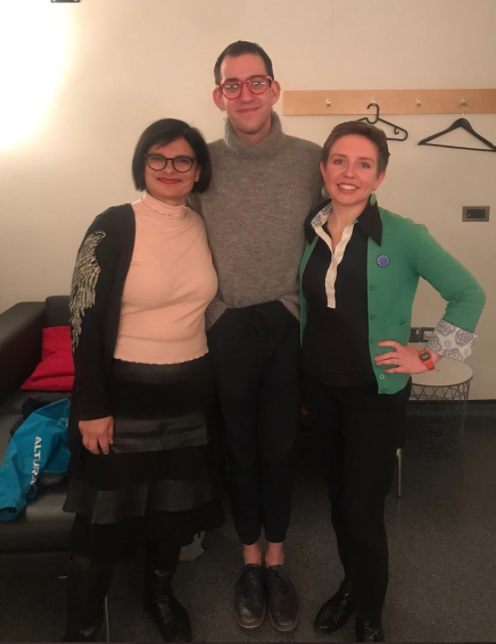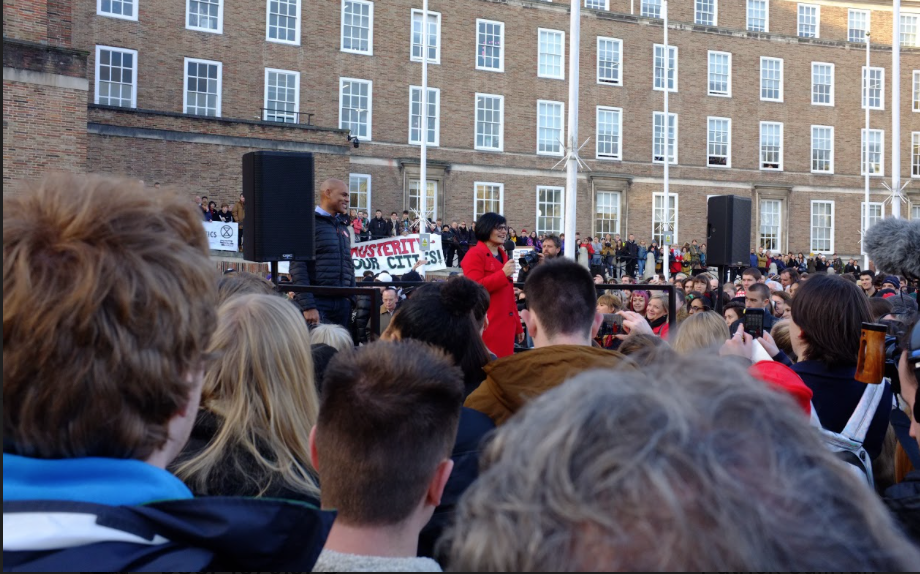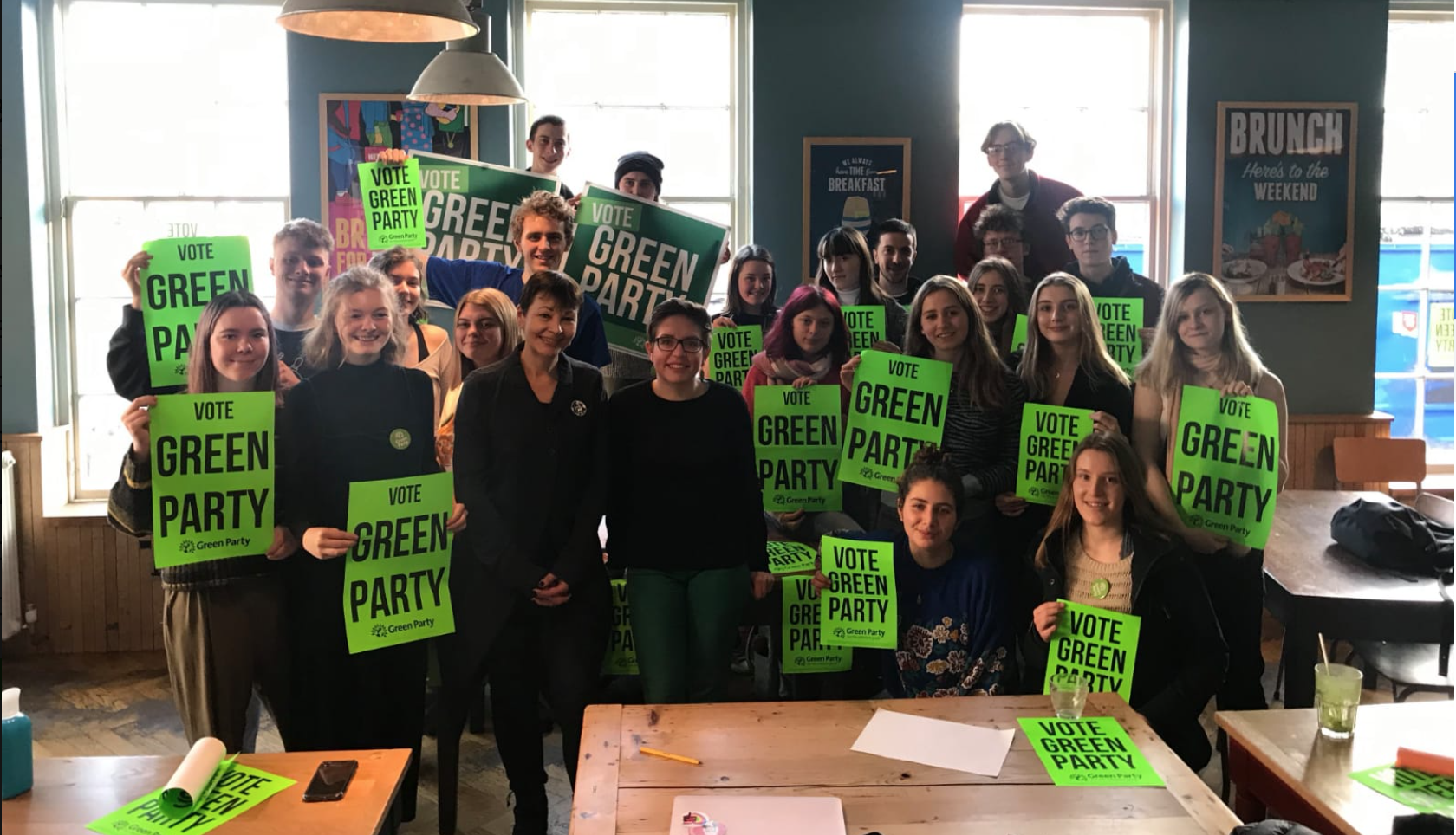By, Callum Ruddock, Third Year Politics and International Relations
Are the Students still listening – Carla Denyer (Green) and Thangam Debbonaire (Labour) seem to think they are. Let's take a look back (with hindsight) at the issues, the arguments and the rhetoric offered at our very own SU ‘General Election’ hustings.

I am sat amongst friends and faced with two candidates seemingly in agreement. The Anson room is still, if a little empty. No one yet knows of the Conservative majority. Pre-screened questions are thrown back and forth somewhat uneasily. As opinions run sour and students begin shifting in their seats I reach for my pen.
Hollow words get thrown amidst the grasp of academia. There is no sign of candidates from the other parties and I don’t blame them. This isn’t their election (well at least not in this seat) and any attempt campaigning to the student body would be a waste of resources. The Greens, however, are betting big on the showing. Natalie Bennet, ex-leader of the party, sits politely on the front row cheering every now and then. Punters are surprised to have been given a leaflet and a soft smile by her as they enter and take their seats. Thangam is the incumbent MP and it shows. She’s better at public speaking and seems to know the right buttons to push in Westminster. Less than 150 miles away, decisions are being made on behalf of students in Bristol West. It’s time for students to hear on what grounds.
Thanks to these fabulous @BrisUniLabour students for coming to and supporting me at the @Bristol_SU Hustings last night and stopping to chat afterwards. See you soon guys! pic.twitter.com/R7M1R30lVp
— Thangam Debbonaire (@ThangamMP) November 23, 2019
I am surprised Denyer doesn’t use the opportunity to challenge antisemitism within the Labour party. Perhaps she feels she needn’t go on the attack, her parties’ policies serving to combat Labour’s bold manifesto promises. Not that Thangam did much to address the great ‘Corbyn question’; the room absolutely sympathetic to his cause (and now legacy). In this sense she rendered herself as a stooge, showing that despite the Labour parties’ more democratic internal structure, she is stuck touting those policies she agrees with and ignoring those she doesn’t. (Even when faced with a group of people who likely would receive them well).

On matters such as Brexit and the economy, the candidates tow the party line. The Green party advocate for remain and it seems many in the room have forgotten the parties’ 2015 manifesto promise to hold a referendum on the nations’ membership of the European Union (the party did pledge to back remain in said referendum). Despite Denyer’s touting of her European credentials, and despite Thangam’s on-brand neutrality, they smile as if in agreement. Thangam certainly expressed her desire for remain, and in a moment of angst went so far as to compliment Corbyn’s change of mind with regards to his leave stance.
Mental health remained thoroughly on the agenda; the responses remained bland. More health spending - yes lovely. More mental health outreach centres - very nice, still in agreement here. At points it doesn’t feel like a debate, just posturing. When questions about the climate begin to surface Denyer makes clear her commitment to the cause. The statements that follow are uncontested, mere bickering over who’s going to spend more and what the outcome of this will be. Labour plays the experience card, not directly, but it’s clear Thangam wants us to know her party has the means to put pressure on international partners regarding the climate crisis.

And then – diversion. Denyer attacks the Labour Party’s lack of action during their last electoral term and wins some applause. Throughout the debate she has frequently drawn on her time as a Bristol Councillor. I sense in her eyes it’s a source legitimacy and proof of capability. Denyer, who successfully proposed to Bristol City Council that it should adopt a climate emergency motion, has a strong track record in climate politics. Whilst this legacy should not be discounted, Thangam is quick to remind Denyer that Westminster looks and feels nothing like Bristol City.
On rent, Denyer pitches rent controls whilst Thangam hammers home about Labour’s commitment to build more affordable housing. I giggle, only a select handful of students have the means to purchase a house. If this is to be a student centric discussion, why focus on buyers? Neither candidate mentions how they hope to properly implement these policy goals. Are they to rely the cabinet-civil service duo? Democracy vs technocratic bureaucracy; the discourse continues.
A Britain who’s future lies very much in the hands of a government dissimilar to the candidates I saw at the SU
By far the most profound moment in the night came in the form of a depressing Q and A session. Few students at this point felt motivated to pitch any questions worthy of a voice, the room remained silent as it had done before until one student stands, quickly reaches for the microphone and boldly asks,
‘how can we trust you?’
Enormously fun #GE2019 hustings at @Bristol_SU this evening:
— Carla Denyer (@carla_denyer) November 22, 2019
A Green-Labour head-to-head, the other parties didn't bother to turn up, which just goes to show it's between Greens and Labour here so you can vote with your 💚
Yes to Europe, No to Climate Chaos. #VoteGreen2019 pic.twitter.com/I5PCAiEfoN
A few organisers in the room blush. My head rotates 360 to get a look at this proud punter. The applause that follows is genuine. Its merit is worthy of our attention. We would be kidding ourselves if a lack of trust in government is something new. We as Bristol students have always been taught to strive for more; to seek what lies beyond the curtain, and whilst it is perhaps naive to expect political candidates to do the same in all cases, you’d hope their parties had some idea of what lies beyond this political horizon. Student issues are those issues faced by many in this country. They’re not profound they’re ordinary. Candidates should be able to blend their utopic ideologies which an understanding of how they will be implemented. They owe it to students and young people to show us their road map for the country, far beyond Brexit Britain. We must avoid populism and its accompanying rhetoric, and whilst I don’t think Denyer and Thangam have fallen into this trap, they cannot rely on criticism of the Conservative Party alone. They must pitch a different path. Show us how their parties have the map to our futures. Prove that we can trust them.
And with that, the hustings were over. Politics remained hopeful. Alas the Green-Labour dream was never to be. Come December 13thwe woke up to face a different Britain. A Britain who’s future lies very much in the hands of a government dissimilar to the candidates I saw at the SU.
Did you find the Bristol SU hustings interesting?









